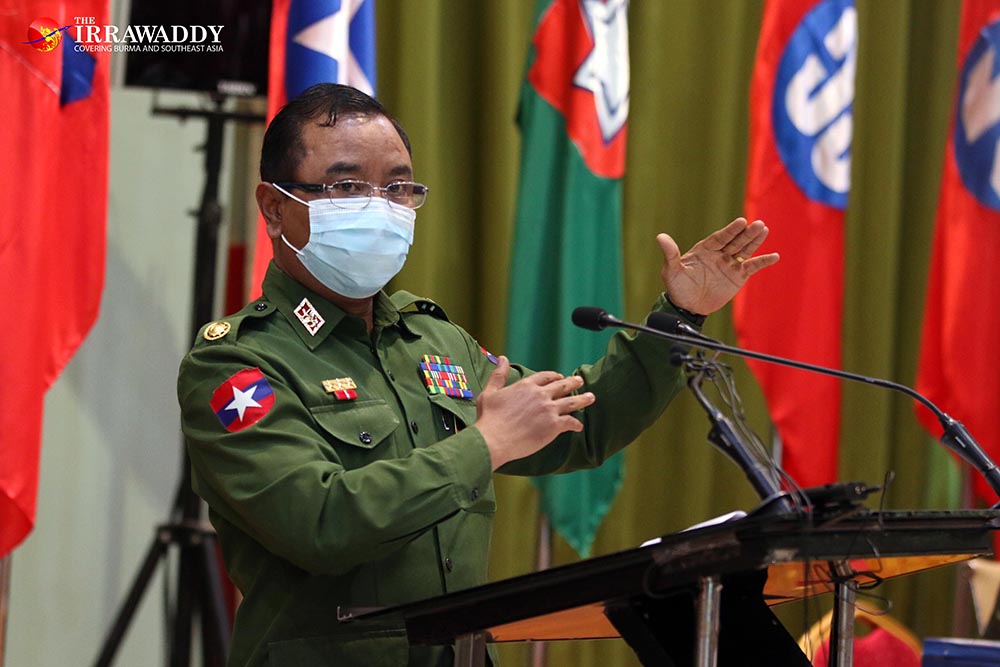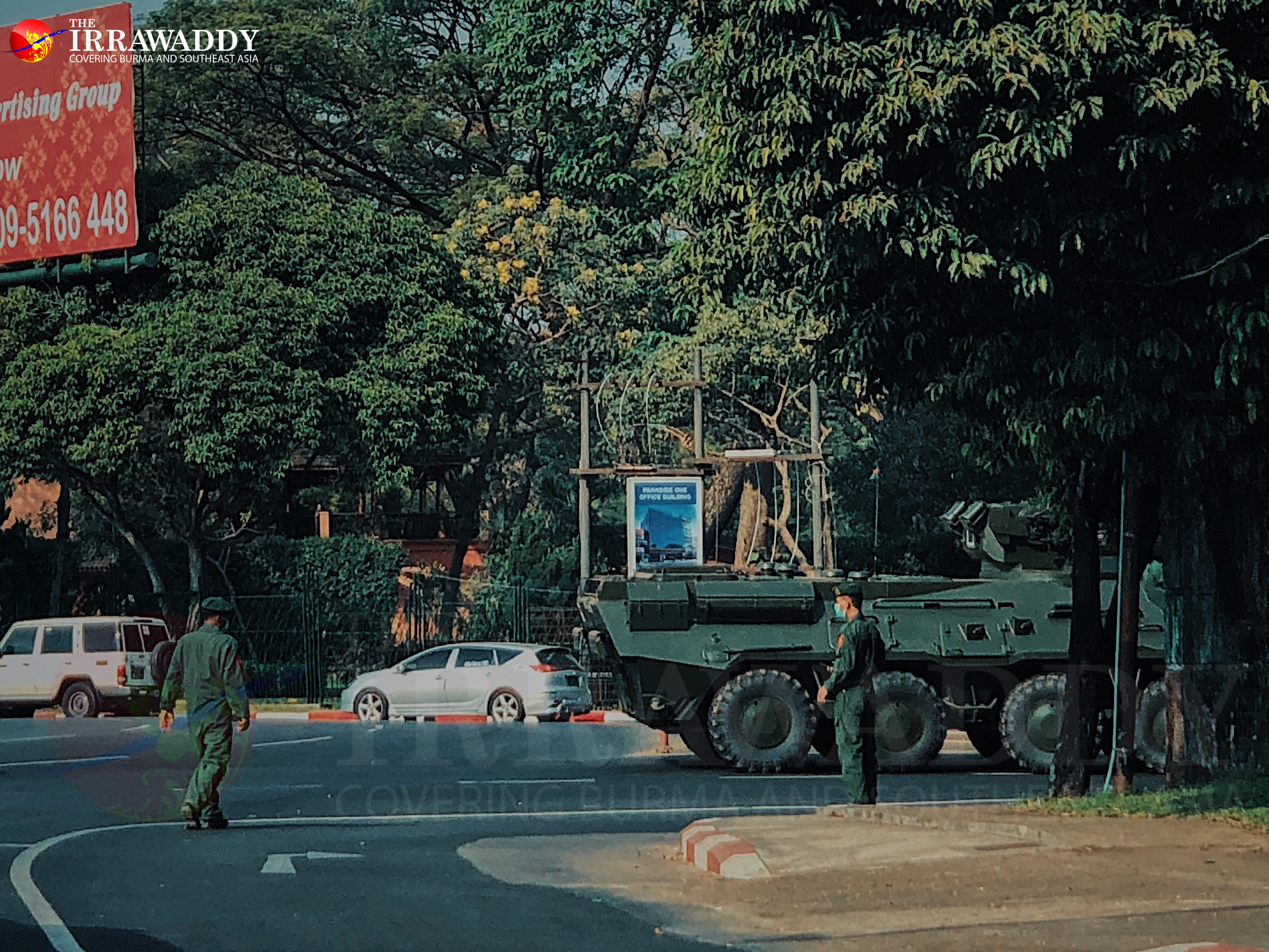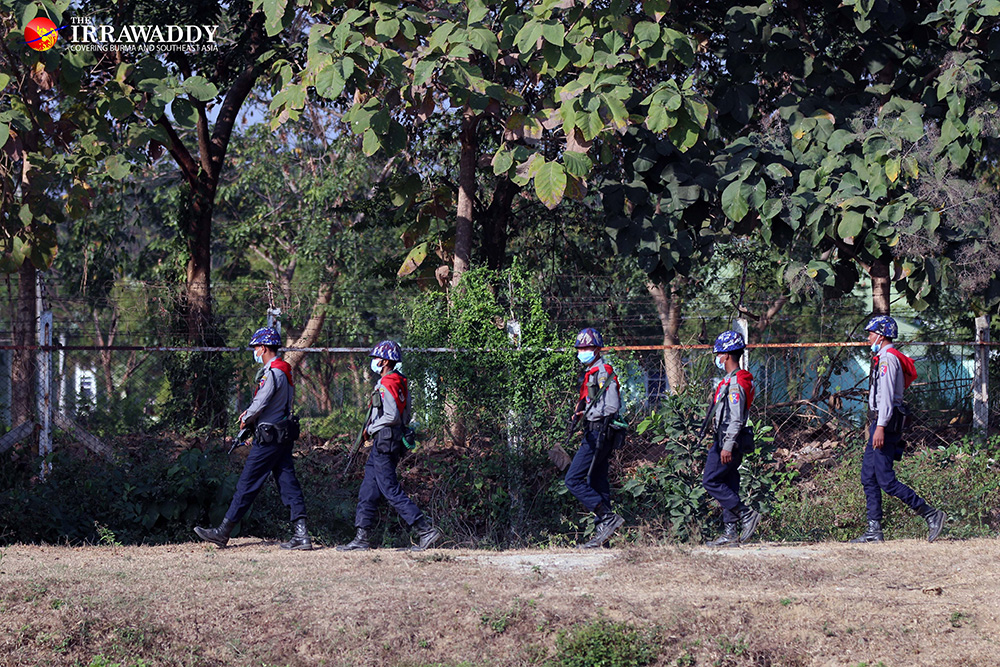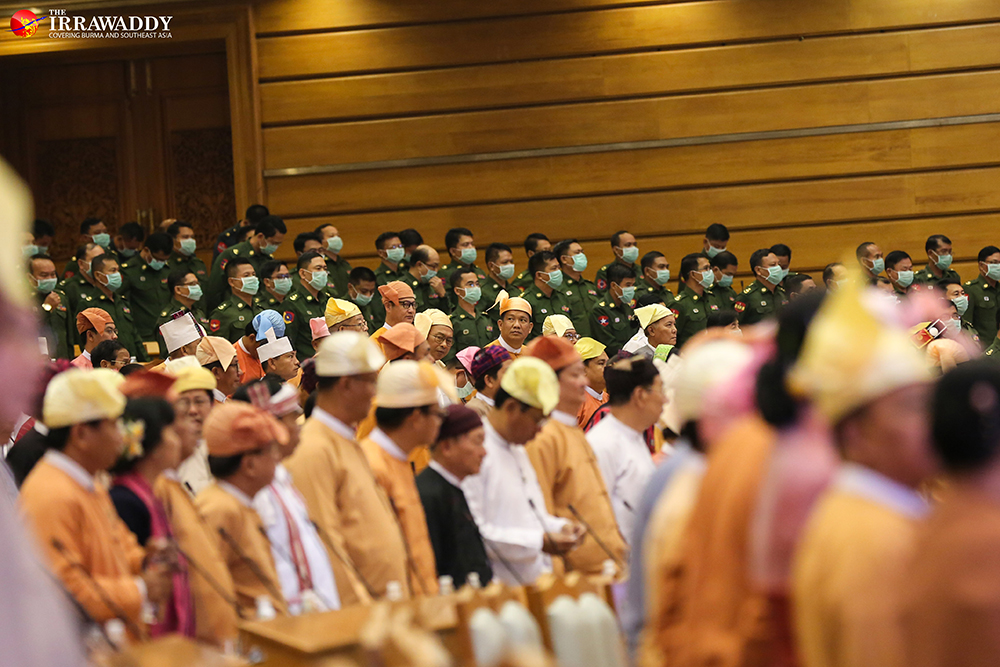Tensions are rising in Myanmar after military spokesman Major General Zaw Min Tun hinted at the possibility of a coup, should the military’s claims of electoral fraud go unaddressed. Particular attention has been paid to his comment on Tuesday that “The military will abide by existing laws including the Constitution. But that doesn’t mean the military will take responsibility for the state or won’t take responsibility for the state.” This has led the media to focus on the likelihood of a coup, though top military leaders say such a step would be a last resort.
The spokesman’s words have fueled concern among citizens, businesspeople, politicians and diplomats. A Yangon-based diplomat told The Irrawaddy that his embassy is watching and monitoring the situation closely and carefully. “There is great cause for concern,” he said.
A day after Maj-Gen Zaw Min Tun spoke, military chief Senior General Min Aung Hlaing said in an address to senior cadets, “The Constitution is the mother law. We have to follow the Constitution. If the law is not respected or followed, we must abolish it. Even if it is the Constitution, we must abolish it. In the time of the Revolutionary Council, the 1947 constitution was abolished.” He seemed to be suggesting that the 2008 Constitution can be abolished. But how?

The Tatmadaw’s recent comments are a departure from military leaders’ repeated assertions in the past that they would safeguard the 2008 Constitution, which was drafted in favor of the country’s former ruling generals.
Who dares abolish the ‘military’s charter’?
Under the 2008 Constitution, the military in Myanmar plays an unusually powerful role in the executive branch of government and in national politics. The army controls three security-related ministries: Defense, Home Affairs and Border Affairs. Moreover, the military’s unelected representatives occupy 25 per cent of the seats in Parliament.
The Constitution states that the president has the executive power to declare a state of emergency, after consulting and coordinating with the military-dominated National Defense and Security Council (NDSC). However, no NDSC meetings have been held since the current government led by the National League for Democracy (NLD) came to power.
Snr-Gen Min Aung Hlaing’s reference to previous constitutions that were abolished has only fueled the speculation. (Myanmar’s 1947 constitution was abolished when General Ne Win staged a coup in 1962; the 1974 charter was scrapped in 1988 when the military staged a bloody coup after crushing a nationwide pro-democracy uprising.)
Meetings between top-ranking government officials have reportedly been held to discuss possible ways of easing the tension, and the NLD has ordered all of its MPs, who are now gathered in the capital preparing to attend the opening of the new Parliament on Feb. 1, to remain calm and not to resist in case of a coup. However, anxiety and foreboding are spreading among NLD MPs, and sightings of armored vehicles on the streets of Yangon have only hightened the concern and tension. Ruling party lawmakers are preparing for the worst-case scenario.
State Counselor Daw Aung San Suu Kyi, who leads the party, and several other MPs previously endured years of incarceration in detention centers and prisons or under house arrest.

In any case, the senior general’s comments have only inflamed the coup speculation, with some pundits predicting a takeover in a matter of weeks—if not days. The military chief’s comment that, if the law is not followed “we must abolish [the Constitution]” is ironic given that just last year the military blocked the ruling party’s bid to amend the charter.
Analysts believe the military’s claims of electoral fraud are motivated by the Union Solidarity and Development Party (USDP)’s heavy defeat in November’s general election. The USDP was founded as a proxy party for the military.
USDP: 2020 poll’s big loser
The USDP won around 10 percent of seats in the Union Parliament in the 2015 general election, but in last year’s poll it secured just 5 percent.
Senior figures in the USDP suffered defeats in the election, losing their races to NLD rivals. This was a serious defeat for the military and its proxy, and the USDP will be a diminished force in the new Parliament.
The USDP was formed in June 2010 to contest that year’s general election. It is an offshoot of the former military junta and the successor to its mass organization, the Union Solidarity and Development Association (USDA). Its evolution is similar to that of the Golkar party in Indonesia, whose origins lie in an organization with military links.
The largest and best-funded military-backed party, the USDP was established to play a major role in national politics over the coming decades. Its senior officials and leaders are former military personnel with strong ties to active military generals.
The patron of the USDA was Senior General Than Shwe, who is now retired and following the unfolding political events from his home in Naypyitaw. It is not known how the former regime leader views the current political stalemate, but it is safe to assume he wants to see stability and a compromise. Neither of those could be achieved through a coup or by abolishing the 2008 Constitution he designed and whose drafting he guided.

After its election drubbing in November, the USDP refused to recognize the results of the general election and called for a re-run of the voting as soon as possible, with the military’s cooperation, “in order to have an election that is free, fair, unbiased and free from unfair campaigning”.
The Union Election Commission (UEC)—whose impartiality and fairness military leaders called into question—rebuffed the calls for a new election.
“It’s their allegation that the election was unfair. It’s from a small group of people. A true democracy values the majority’s wish,” said UEC official U Myint Naing.
In December, the military came to the USDP’s rescue, saying the armed forces were scrutinizing and reviewing voting in 218 townships where military personnel and their relatives cast ballots on Nov. 8.
The UEC instructed its sub-commissions not to hand out electoral documentation without its permission a day after the military called for documents to be provided to support its probe into claims of fraud.
Mid-ranking military officers in Naypyitaw say the ball is in the UEC’s court and that it must now come out and refute the allegation. They say that Snr-Gen Min Aung Hlaing doesn’t want to be pushed into a corner, where he will have no choice but to stage a coup.
Political analysts in Yangon suspect the military leaders would like to see the UEC dissolved, but this is impossible.
NLD–dominated Parliament
Myanmar’s newly elected Parliament, the second assembly dominated by the NLD, is due to convene on Feb. 1. The USDP and the military don’t want to proceed with this parliamentary session and have reportedly demanded that the government postpone it.

In its second straight landslide election victory on Nov. 8, the ruling NLD won 396 out of 476 elected seats (83 percent) in the two houses of Parliament, allowing it to form the next government. The USDP won only 33 seats (around 7 percent). The military representatives will have their usual quota of 25 per cent of seats, meaning a combined 166 military personnel will sit in the two houses of Parliament. In December, the military released the new list of names of its appointed lawmakers who will attend the upcoming Parliament session.
In the new Parliament, the USDP—a once powerful, ruling party—will no longer be a tiger but a kitten. This is a real concern for the military and the USDP.
You may also like these stories:
A Military Coup in Myanmar Is Unlikely, But….
Myanmar Military Refuses to Rule Out Coup as It Presses Claim of Fraud in Nov. Election
Updated Timeline: Tracing Military’s Interference in Myanmar Election

















